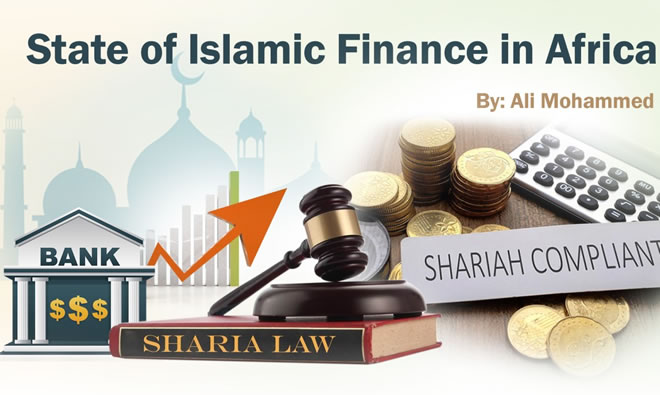
 Ali Mohamed
Ali Mohamed
Tuesday, August 11, 2020
Islamic banks engage in many conventional banking activities that all banks do. However, there are a few activities that they do not. Certain levies, such as interest, and specific activities – such as gambling and alcohol-related investments – are not done by Islamic banks. These are prohibited as prescribed by Sharia law. Therefore, Islamic Finance is a form of banking that is compliant with Sharia law.
Under Islamic Finance, interest on loans, bonds, and bank deposits is forbidden. The primary function of Islamic Finance is to promote trade by transferring finance from surplus areas to deficit areas without interest charges. Instead, other considerations, such as profit sharing, come into play.
The secondary function of Islamic Finance is to provide agency services, such as money transfer, trade finance, and other market services considered halal to compete with conventional banks.
Globally, the Islamic Finance industry is estimated at over US$2 trillion. Islamic banking and finance assets have concentrated historically in the Middle East and Malaysia. These markets currently account for more than 80% of industry assets. According to Moody's, the size of the Islamic finance industry in Africa has the potential to grow to US$ 235 billion.
Africa has a Muslim population of approximately 700 million, representing almost 53 percent of Africans. In sub-Saharan Africa alone, where the Islamic Finance industry is still underdeveloped, Muslims will increase to 385.9 million by 2030.
In Africa, Islamic banking exists under two different models. The first model consists of setting up fully-fledged Islamic banks, while the second model consists of setting up windows dedicated to Islamic Finance within conventional banks. Other Islamic Finance services include Islamic insurance (Takaful), Shariah-compliant investment services, and Islamic microfinance. Murabaha, the practice by which a bank buys goods and sells to a customer on a deferred basis, is the most dominant form of Islamic finance in Africa, consisting of 56% of all activities.
The origin of Islamic finance in Africa can be traced back to the 1960s, with Egypt being the first African country offering Islamic banking under a low profile for political reasons. However, other countries followed suit. There are now more than 80 Islamic financial institutions in Africa. Most of these institutions have been licensed in the last five years. South Africa, Nigeria, Kenya, Senegal, Djibouti, Uganda, and Morocco have all introduced legal and regulatory frameworks to promote Islamic finance products in their jurisdictions.
Kenya's stamp duty and VAT regulations were amended to create a more level playing field between Sharia-compliant and conventional products. Nigeria, Tunisia, and South Africa are now home to Islamic banks and Takaful (Islamic insurance) companies. As mentioned earlier, several traditional banks across the continent have also started offering Sharia-compliant banking products through "Islamic windows."
In Somalia, all financial activities are based on Sharia law. Increasingly, there is no room for conventional banking in Somalia. In this regard, the Central Bank of Somalia is in the final stages of passing Islamic Finance regulations for its 13 Islamic licensed Banks in Somalia. These include Amal Bank, Dahabshiil Bank, Salaam Bank, Premier Bank, among others in Mogadishu. The Sombank, a new bank currently being established, will offer pure digital Sharia-compliant Islamic finance to its customers once its in full operation.
The European investment bank estimates that in 2017, as many as 350 million Africans did not have formal bank accounts. Islamic finance products are a credible alternative to conventional banking and insurance offerings and could significantly increase Africa's access to finance.
Islamic Finance offers African nations an opportunity to increase financial inclusion among Africans. In this regard, West African countries, namely Cameroon, Mali, and Nigeria, have made some progress in developing Islamic microfinance. Members of Africa's Muslim communities are reluctant to accept financial services provided by conventional banks on religious grounds. This means that there is an incredibly high unmet demand for Sharia-compliant financial products across the continent.
An indicator of this is the fact that East Africa is now home to the most significant number of Islamic banking providers in Africa. Indeed, the Sudanese Takaful market is the most important in Africa and ranks as the third-largest in the world after the GCC (Gulf Cooperation Council) countries and Malaysia. This is because the Sudanese financial system is fully mature Sharia-compliant.
Islamic banking offers African governments a non-usurious means of raising the funding needed for infrastructure investment, which is estimated to be approximately US$ 170 billion per year. Islamic banking can unlock investment from the Middle East and other parts of the world, and African governments have noticed. As a result, some African governments have issued international or domestic Sukuk (Islamic bonds). These include South Africa, Senegal, Nigeria, Côte d'Ivoire, and Togo. Indeed, these countries did so ahead of Northern African countries such as Tunisia and Morocco.
Sukuk bonds are attractive to investors because they offer an opportunity to diversify their holdings, but because the Islamic banks that invest in Sukuk hold their investments until maturity, which creates a stable investment for everybody.
Islamic banking transactions are backed by real assets giving tiny room for speculation and lower non-performing loans (NPLs). As a result, Islamic banks have lower non-performing loan (NPL) ratios but higher loan loss provisions. Overall, Islamic banks in Africa are more stable as they report lower insolvency risk and higher returns on average assets.
In Nigeria, the only Islamic bank, Jaiz Bank, has grown its assets by 519% in the last five years. It has expanded from just three branches in 2013 to 33 and serving 230,000 customers. Meanwhile, Sterling bank Plc has also seen asset growth of its Islamic finance division, which serves over 50,000 customers and has a balance sheet of over US$100 million.
In Kenya, Gulf African Bank and Safaricom have partnered to develop M-Sharia, a Sharia-compliant banking service through M-Pesa. However, the potential remains vast. The number of African countries offering Sharia-compliant products is fewer than 30 out of 54 countries. Africa's large Muslim population, mostly unbanked or underserved, will provide a solid foundation in which Islamic banking assets will proliferate.
Ali Mohamed
Managing Director at AqilPay